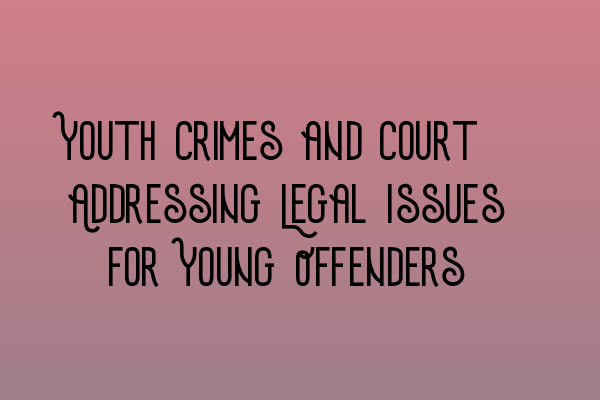Youth Crimes and Court: Addressing Legal Issues for Young Offenders
Welcome to our blog post about youth crimes and court proceedings for young offenders. In this post, we will discuss the legal issues surrounding youth crimes and highlight the importance of understanding the legal process for young individuals involved in criminal activities. It is crucial to remember that the information provided here is not legal advice, but rather an overview of the topic. To seek professional legal advice, please consult with a qualified criminal solicitor for accurate information and guidance.
The Rise of Youth Crimes
In recent years, there has been a concerning increase in youth crimes across the UK. Understanding the reasons behind this rise requires a holistic approach that takes into account various social, economic, and psychological factors. Factors such as peer pressure, lack of positive role models, and socio-economic challenges can contribute to the involvement of young individuals in criminal activities.
It is crucial to address the root causes of youth crimes and provide support systems to prevent young individuals from becoming repeat offenders. Early intervention programs, mentorship initiatives, and access to quality education are some of the strategies that can help combat youth crimes effectively.
Legal Framework for Young Offenders
When young individuals are involved in criminal activities, the legal framework in the UK handles their cases differently from adult offenders. The age of criminal responsibility in England and Wales is 10 years old. Individuals aged 10 to 17 are generally considered as young offenders and are subject to unique legal procedures and penalties designed specifically for their age group.
The primary objective of the youth justice system is to prevent reoffending and promote the rehabilitation and reintegration of young offenders back into the society. The system aims to provide fair and proportionate punishments, while also addressing the underlying issues that contribute to their criminal behavior.
If you would like to know more about the legal framework for young offenders, we recommend reading our article on SQE 1 Practice Exam Questions. This article provides comprehensive information about the legal processes and penalties applicable to young offenders.
Alternative Options to Custodial Sentences
When dealing with young offenders, the justice system recognizes the importance of considering alternatives to custodial sentences. Imprisonment can have a detrimental impact on young individuals and may hinder their chances of rehabilitation and successful reintegration into society.
Community-based sentences, such as restorative justice programs, community service orders, and referral orders, aim to address the root causes of criminal behavior and offer young offenders the opportunity to make amends for their actions. These alternative options focus on rehabilitation, education, and skill development rather than punishment, providing a more constructive approach to youth justice.
If you want to explore the alternative options available to young offenders in more detail, we recommend checking out our article on SQE 1 Practice Mocks FLK1 FLK2. It offers insights into the various community-based sentencing options and their effectiveness in reducing reoffending rates among young individuals.
Supporting Young Offenders
Supporting young offenders goes beyond the legal proceedings and penalties. It involves providing them with the necessary guidance, education, and support to help them make positive changes in their lives. Collaborative efforts between legal professionals, social workers, educators, and community organizations are essential in ensuring the successful rehabilitation and reintegration of young offenders.
If you are interested in learning more about the support systems available for young offenders, we recommend our article on SQE 2 Preparation Courses. This article highlights the importance of comprehensive support services and provides useful resources for professionals working with young individuals involved in the criminal justice system.
Conclusion
Addressing legal issues for young offenders requires a proactive and holistic approach. By understanding the legal framework, exploring alternative sentencing options, and providing comprehensive support, we can contribute to the successful rehabilitation and reintegration of young individuals involved in criminal activities. It is our collective responsibility to ensure a fair and effective youth justice system that focuses on prevention and rehabilitation.
For more information about the SQE exams and important dates related to the qualification process, be sure to visit our article on SRA SQE Exam Dates.
We hope you found this blog post informative. If you have any questions or would like to discuss youth crimes and legal issues further, please feel free to contact us at SQE Criminal Law & Practice Law UK.
